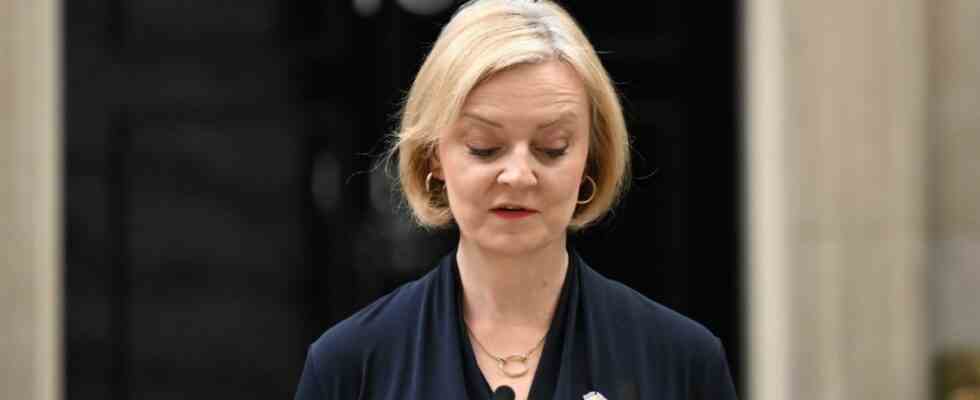She was only in office for 45 days, and now British Prime Minister Liz Truss is resigning: she spoke at a press conference scheduled at short notice in front of her office in London’s Downing Street.
“I recognize that in this situation I cannot fulfill the mandate with which I was elected by the Conservative Party,” Truss said. She only spoke for 90 seconds. She will remain in office until a successor has been appointed, said the conservative politician. You already did that with King Charles III. discussed.
The election of the new party leadership should take place within the coming week. “This will ensure that we stay on track to implement our fiscal plans and maintain our country’s economic stability and national security,” Truss said. In the tradition of British politics, the office of Prime Minister and the respective party leadership are inseparable. A division of offices such as in Germany, where Chancellor Olaf Scholz is not chairman of the SPD, is not common in Great Britain.
Truss had a tough time from the start
Truss only succeeded Boris Johnson at the beginning of September, who resigned after several scandals and scandals under pressure from his own party. But the new prime minister had a hard time from the start. She was heavily criticized for her financial and economic policies. Within a few days, she lost two ministers in her cabinet: last week, Truss fired Finance Minister Kwasi Kwarteng, who had experienced a debacle with a tax reform. And yesterday Home Secretary Suella Braverman was replaced. It was Truss’ last-ditch effort to stay in office. She will now go down in British history as the shortest-serving Prime Minister.
The number of Truss supporters in our own ranks has also been decreasing recently. During a vote – the content of which is actually rather insignificant – on a motion by the opposition Labor Party on the subject of fracking, tumultuous scenes are said to have erupted in the British House of Commons on Wednesday evening. The government declared the vote a vote of confidence, but then surprisingly withdrew it. Several Conservative MPs complained that they were not able to vote freely and had been harassed.
Since Liz Truss took office, the Tories have also slumped in the polls. The latest poll by polling firm Redfield & Wilton, which was published on Mondaysees the Conservatives 36 percentage points behind Labor – one of the widest gaps ever measured between the two main British parties.
The financial markets, which were at times in turmoil because of the government’s tax plans in London, reacted positively to Truss’s resignation: the British pound rose by almost one percent compared to the dollar. The British stock market also turned positive.
In her statement, Truss announced that a new party leader should be found within a week. A number of names are likely to circulate in the coming days and there are also some observers who are speculating that Boris Johnson, who is still popular with the party base, will return. Of the Times-Journalist Steven Swinford writes on Twitter, he had received the information that Johnson was still sounding out the mood in the party, but was ready to start. This is “a matter of national interest,” said the former prime minister.
Calls for new elections are getting louder on the part of the opposition. Scottish Prime Minister Nicola Sturgeon, for example, who belongs to the Scottish Nationalist Party, a social-democratic party on economic issues that is striving for Scotland’s independence from the United Kingdom, is calling for this. Sturgeon writes on Twitter: “A new election is now a democratic imperative. There are no words to adequately describe this mess”.
Regardless of which of the parties in Britain you belong to – this observation should be a consensus.
With material from the news agencies Reuters and dpa

